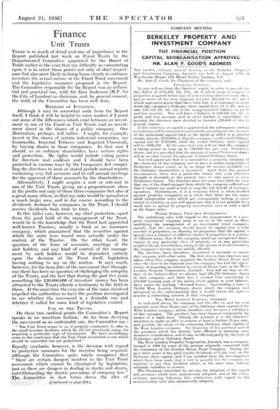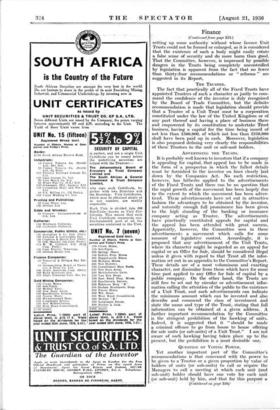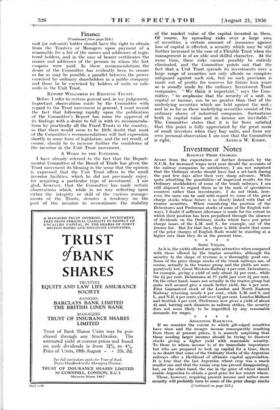Finance
Unit Trusts
THKRE is so much of detail and also of importance in the Report: published last week an Fixed Trusts by the Departmental Committee appointed by the Board of Trade earlier in the year that my difficulty in commenting upon it is to select those points not only of chief import- ance bill also most likely kilning home clearly to ordinary investors the actual nature of the Fixed Trust movement and the legislative measures proposed in the Report. the Committee responsible for the Report was an influen- tial and practical one, with Sir Alan Anderson (M.P. for the City of London) as chairman, and, by general consent, the work of the Committee has been well done.
METHOD'S OF INVESTING.
Although it may be somewhat aside from the Report itself, I think it will be helpful to some readers if I point out some of the differences which exist between an invest- ment in one of the Fixed or Unit Trusts and an invest- Meat direct in the shares of a public company. One illustration, perhaps, will suffice. I might, for example, invest in the shares of pertain industrial companies, say Courtaulds, Imperial Tobacco and Imperial Chemicals, by buying shares in those companies. In that ease I should, as an ordinary shareholder, have certain rights and protection. My rights would include voting power tor. directors and auditors and I should have been protected in various ways by the Companies Act compel- ling the directors to issue at stated periods annual reports containing very full accounts and to call annual meetings for the approval of those accounts by the shareholders.
• Alternatively, I might acquire a unit or sub-unit in one of the Unit Trusts giving me a proportionate share in the profits not only of those three companies but also of a great many others, so that my risks would be spread over a much larger area, and in due course, according to the dividends declared by companies in the Trust, I should receive dividends from time to time.
In this latter ease, however, my chief protection, apart from the good faith of the management of the Trust, would lie in the knowledge that the Trust had appointed Well-known Trustees, usually a bank or an insurance company, which guaranteed that the securities against Which the_ units were issued were actually under the Control of the Trustee. On the other hand', the question of the form of accounts, meetings of the unit holders, and any kind of control of the manage- ment by such holders would be dependent entirely upon the decision of the Trust itself, legislation having nothing to say on the matter. It says much, however, for the bona fides of the movement that through- out there has been no question of challenging the integrity of the Trusts, and the fact that during the past five years something like £50,000,000 of investors' money has been attracted to the Trusts affords a testimony to the faith in them. At the same time the very size of the sums involved impelled the 'authorities to haVe the position investigated to see whether the movement is a desirable one and whether it called for some kind of legislative control.
USE or THE TRUSTS.
On these two cardinal points the Committee's Report speaks in no uncertain fashion. So far from decrying the movement as an undesirable one, the Committee say : " The Unit Trust seems to us,. if properly conducted, to offer to the small investor facilities, which be did not previously enjoy, for acquiring a particular type of 'investment. We have accordingly come lathe conclusion that the Ilea Trust movement is one which should be controlled; beet not prohibited."
Equally emphatic, however,. is the decision with regard to protective measures for the investor being required, although the Committee quite wisely recognises that " there are certain dangers incident to the Unit Trust. movement which cannot be eliminated by legislation, just as there are dangers in dealing in stocks and shares, notwithstanding ,the drastic provisions of company law.": .331e. _Committee in fact turns down the idea of - (continued on pagi:324.)
_
Finance
• (Continued from page 323.) setting up some authority without whose licence Vnit Trusts could not be formed or enlarged, as it is considered that the existence of such a body might easily create a false sense of security and do more harm than good. That the Committee, however, is impressed by possible dangers in the Trusts being completely uncontrolled by legislation is apparent from the fact that no fewer than thirty-four recommendations or " reforms are suggested in its Report, THE TRUSTEE.
The fact that ;practically all of the Fixed Trusts have appointed Trustees of such a character as justly to com- mand the confidence of the investor is duly recognised by the Board of Trade Committee, but the definite recommendation is made that legislation should provide that a Trustee of a Unit Trust must be a corporation constituted under the law of the United Kingdom or of any part thereof and having a place of business there and empowered by its constitution to undertake Tiust business,, having a capital for the time being issued of not le'Sa than £500,000, of which not less than 1250,000 shall have been paid up in cash. Moreover, legislation is also proposed defining very clearly the responsibilities of these Trustees to the unit or sub-unit holders.
ADVERTISING THE TRUSTS.
It is probably well known to investors that if a company is- appealing for .capital, that appeal has to be made in the form of a prospectus in which the fullest details must be furnished to the investor on linei clearly laid down by the Companies Act. No such restriction, however, has ,hitherto applied to the advertisements of the Fixed Trusts and 'there can be no question 'that the rapid growth of the movement has been largely due to the extent to which the movement has been adVer- tised. Thcse advertisements have set out in attractive fashion the advantages to be obtained by the investor, and naturally enough full prominence has been giiren to the high standing of the banking or insurance company acting as Trustee. The advertisements have practically constituted appeals for capital and the appeal has been attended with great success. Apparently, however, the Committee sees in these advertisements a movement which calls for some measure of legislative control. Accordingly, it' is proposed that any advertisement of the Unit Trusts, where its character might. be regarded as an appeal for capital or an Offer for Sale, should be considered illegal unless it gives with regard to that Trbst all the infor- mation set out in an appendix to the Committee's Report. These details are of a most voluminous and exacting character, not dissimilar from those which have for some time past applied to any Offer for Sale of capital by a public company. On the other hand, the Trusts are still free to set out by circular or advertisement infor- mation calling the attention of the public to the existence of a Unit Trust, and such advertisements can indicate the minimum amount which can be invested and ,also describe and commend the class of investment and state the name and type of the Trust,- stating that full information can be obtained at a given address. A further important recommendation by the Committee is the stringent prohibition of the hawking of units. Indeed, it is suggested that it " should be made a criminal offence to go from house to house offering for sale units (or sub-units) of a Unit Trust." I am not aware of such hawking having taken place up to" the present, but the prohibition is a 'most desirable one..
QUESTION OF VOTING POWER.
Yet another important part of the Committee's recommendations is that concerned with the power to be given to a Trustee or a given proportion by value of holders of units (or sub-units) to call or require - the Managers to call a meeting at which each unit (and sub-unit) holder should have one vote for each unit (or sub-unit) held, by him, and that for this purpose a (CAI timid 071 page 326)•
Finance
(Continued from page 324:) unit (or sub-unit) holder should have the right to obtain from the Trustees or Managers upon payment of a reasonable fee a list of the names and addresses of regis- tered holders, and in the case of bearer certificates the names and addresses of the persons to whom the last coupons were paid. In these recommendations the desire of the Committee has evidently been to ensure as far as may be possible a parallel between the power exercised by ordinary shareholders in a public company and those to be exercised by holders of units or sub- units in the Unit Trust.
REPORT WELCOMED BY EXISTING TRUSTS.
Before I refer to certain general and, in my judgement, important observations made by the Committee with regard to the Trust movement in general, I must record the fact that following rapidly upon the publication of the Committee's Report has come the approval_ of its findings with a desire to fall in with its recommenda- tions by practically all the Fixed Trusts in the country, so that there would seem to be little doubt that most of the Committee's recommendations will find expression shortly in some form of legislation, and the net "result, of course, should be to increase further the confidence of the investor in the Unit Trust movement.
A WORD. TO THE INVESTOR- I have already referred to the fact that the Depart- mental Committee of the Boaql of Trade has given the Trust movement its blessing in the sense that the opinion is expressed that the Unit Trust .offers to the small investor facilities, which he did not previously enjoy, for acquiring a particular type of investment. I am glad, however, that the Committee has made certain observations which, while in no way reflecting upon either the integrity or skill of the various manage- ments of the Trusts, denotes a tendency on the part of the investor to overestimate the stability of the market value of the capital invested- in them. Of course, by spreading risks over a large area of securities, a certain amount of insurance against loss of capital is effected, a security which may be still further increased in the case of a Flexible Trust when the management is of an able and skilful character. At the same time, these risks cannot possibly be entirely eliminated, and the Committee points out that the fact that a; Unit Trust spreads its investments over a large range of securities not only affords -no complete safeguard • against -such risk, but no such provision is made out of profits for reserves for future lean years as is usually "Made by the ordinary Investment Trust companies. " Wes think it important," says the Com- mittee; " to emphasise that the se,curity of a unit, in capital or income, can be no greater than that -of the underlying securities which are held against the unit ; and in so far- as -these underlying securities consist' of the ordinary shares of industrial companies, fluctuations both in capital value and in income are inevitable." The Committee states that it is far from satisfied that this point is fully appreciated. by the great ma3S of small investors when they buy units, and from my own personal observation I am sure that the Committee








































 Previous page
Previous page